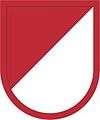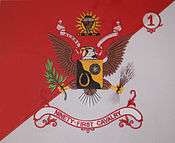91st Cavalry Regiment
| 91st Cavalry Regiment (Airborne) | |
|---|---|
|
1st Squadron Colors | |
| Active | 1928–45; 1950; 1953; 2006 – present |
| Country |
|
| Branch |
|
| Type | Light Airborne Reconnaissance |
| Role | Reconnaissance, Surveillance and Targeting Acquisition |
| Part of | 173rd Airborne Brigade Combat Team |
| Garrison/HQ |
Tower Barracks Grafenwöhr, Germany |
| Nickname(s) | "The Airborne Cav" |
| Motto(s) | "Alert" |
| Engagements |
World War II Operation Enduring Freedom |
| Commanders | |
| Current commander | LTC Kyle Reed |
| Notable commanders |
CPT Harold G. Holt LTC Harry W. Candler LTC Charles A. Ellis LTC H. Bruss LTC Christopher Kolenda LTC Paul W. Fellinger LTC Whit Wright |
| Insignia | |
| Distinctive Unit Insignia |
 |
| Beret Flash |
 |
| Background Trimming |
|
| U.S. Cavalry Regiments | |
|---|---|
| Previous | Next |
| 89th Cavalry Regiment | 98th Cavalry |
The 1st Squadron, 91st Cavalry Regiment (Airborne) is a light Airborne Reconnaissance Squadron currently serving as the 173rd Airborne Brigade's Reconnaissance, Surveillance and Targeting Acquisition (RSTA) Squadron based out of Tower Barracks in Grafenwöhr, Germany. It is the only Airborne RSTA Squadron within the European, Middle East, and Africa (EMEA) area of responsibility.
The 91st Reconnaissance Squadron was originally organized as a mechanized cavalry reconnaissance squadron in the 1st Cavalry Division. It was the oldest and most experienced squadron (battalion) sized mechanized reconnaissance unit in the Army. It completed six campaigns in North Africa, Sicily, and Italy during World War II, while attached to various infantry and armored divisions. The 91st Cavalry Recon Squadron was a non-divisional unit and reported directly to the Army's II Corps. The unit was deactivated on 23 June 1953.
The 91st Reconnaissance Squadron was re-activated, re-organized, and re-designated the 1st Squadron (Airborne), 91st Cavalry Regiment on 8 June 2006, at Conn Barracks in Schweinfurt, Germany. This reactivation was part of the transition of the 173rd Airborne Brigade to the U.S. Army's new modular force structure. This reactivation was the first time the colors of the 1st Squadron (Airborne), 91st Cavalry Regiment had flown since the end of World War II.
Organized as ″Task Force Saber″, 1-91 CAV has subsequently deployed three times to the International Security Assistance Force's (ISAF) Regional Command East in Eastern Afghanistan during Operation Enduring Freedom (OEF). During OEF VIII 2007-08, the Squadron deployed troops to Nuristan, Kunar, Nangarhar, and Paktika Provinces. During OEF X from 2009-10, and OEF XII-XIII from 2012-13, the Squadron deployed to Logar Province.
Soon after returning to Germany from OEF XIII in March 2013, 1-91 CAV moved from Conn Barracks in Schweinfurt to Tower Barracks in Grafenwöhr due to a Brigade realignment and the imminent closure of USAG Schweinfurt. After moving to Tower Barracks, 1-91 CAV shifted focus from the OEF mission to Airborne proficiency, and NATO support and tactical reassurance. Since 2013, 1-91 CAV has conducted operations in Poland, the Czech Republic, Italy, France, Lithuania, Latvia, Estonia, Romania, and Israel in addition to its German home. Most notably, 1-91 CAV represented the United States in several internationally recognized NATO exercises to include: Operation Steadfast Jazz, Operation Atlantic Resolve and Operation Saber Junction.
Lineage
- 1st Armored Car Squadron (1928–1939)
- 1st Reconnaissance Squadron (1939–1941)
- 91st Reconnaissance Squadron (1941–1945)
- 91st Reconnaissance Battalion (1950)
- 91st Armored Cavalry Reconnaissance Battalion (1953)
- 1st Squadron, 91st Cavalry Regiment (ABN) (2006 – present)
Honors
Medal of Honor Recipients
- 1LT Gerry H. Kisters - 31 July 1943, Nicosia, Gagliano, Italy
- (From Citation) "...On 31 July 1943, near Gagliano, Sicily, a detachment of one officer and nine enlisted men, including Sergeant Kisters, advancing ahead of the leading elements of U.S. troops to fill a large crater in the only available vehicle route through Gagliano, was taken under fire by two enemy machineguns. Sergeant Kisters and the officer, unaided and in the face of intense small arms fire, advanced on the nearest machinegun emplacement and succeeded in capturing the gun and its crew of four. Although the greater part of the remaining small arms fire was now directed on the captured machinegun position, Sergeant Kisters voluntarily advanced alone toward the second gun emplacement. While creeping forward, he was struck five times by enemy bullets, receiving wounds in both legs and his right arm. Despite the wounds, he continued to advance on the enemy, and captured the second machinegun after killing three of its crew and forcing the fourth member to flee."
- 1LT Gerry H. Kisters was the first serviceman to be awarded both the Congressional Medal of Honor and the Distinguished Service Cross during World War II.
Distinguished Service Cross Recipients
- 1LT Gerry H. Kisters - 7 May 1943, Ferryville, Tunisia
- (From Citation) "...In May 1943, Ferryville, Tunisia, Sergeant Kisters made several individual reconnaissance missions, returning each time with timely and valuable information concerning location of artillery emplacements. Alone, and while subjected to enemy heavy artillery and concentrated machine gun fire, and individual rifle fire, Sergeant Kisters crept forward on an artillery piece which was firing on our forces. By the effective use of his hand grenades and rifle fire, Sergeant Kisters wiped out the entire crew."
- SGT Peter T. Perkins - 3 Aug 1943, Sicily, Italy
- (Synopsis, Citation Needed) "...Sergeant Peter T. Perkins (ASN: 18009273), United States Army, was awarded the Distinguished Service Cross (Posthumously) for extraordinary heroism in connection with military operations against an armed enemy while serving with the 91st Reconnaissance Squadron, in action against enemy forces on 27 July 1943. Sergeant Perkins' intrepid actions, personal bravery and zealous devotion to duty at the cost of his life, exemplify the highest traditions of the military forces of the United States and reflect great credit upon himself, his unit, and the United States Army."
- LTC Charles A. Ellis - 2–3 July 1944, Serrazzone, Fonano, Italy
- (Synopsis, Citation Needed) "...The President of the United States takes pleasure in presenting the Distinguished Service Cross to Charles A. Ellis, Lieutenant Colonel (Cavalry), U.S. Army, for extraordinary heroism in connection with military operations against an armed enemy in action against enemy forces on 2 and 3 July 1944. Lieutenant Colonel Ellis' intrepid actions, personal bravery and zealous devotion to duty exemplify the highest traditions of the military forces of the United States and reflect great credit upon himself, his unit, and the United States Army."
Silver Star Recipients
- PVT Carl Moore; B 91st RECON; 3 Aug 1943; Sicily, Italy
- MAJ Thomas Bostick; B 1/91 CAV; 27 July 2007; Nuristan, Afghanistan
- 1LT John Meyer; B 1/91 CAV; 27 July 2007; Nuristan, Afghanistan
- 1LT Alex Newsom; B 1/91 CAV; 27 July 2007; Nuristan, Afghanistan
- SGT[1] Robert Fortner; B 1/91 CAV; 27 July 2007; Nuristan, Afghanistan
World War II Configuration
- 91st Cavalry Reconnaissance Squadron (1941–1943)
- Headquarters Troop
- A Troop (Recon, Scout Car)
- B Troop (Recon, Scout Car)
- C Troop (Recon, Bantaam)
- E Troop (Light Tank)
- 91st Cavalry Reconnaissance Squadron (1943–1945)
- Headquarters Troop, with Pioneer and Demolitions Platoon
- A Troop (Recon, Scout Car)
- B Troop (Recon, Scout Car)
- C Troop (Recon, Bantaam)
- D Troop (Support Troop)
- E Troop (Light Tank)
- F Troop (Heavy Guns)
Current configuration
- 1st Squadron, 91st Cavalry Regiment (Airborne)
- HHT Troop (CMD GRP, MED, COMMO, FIST, Mortar)
- A Troop (Recon Scout)
- B Troop (Recon Scout)
- C Troop (LRS Infantry, Sniper)
- D Troop (Support, Maintenance/Transportation)
See also
- United States Army branch insignia
- Coats of arms of U.S. Armor and Cavalry Regiments
- Cavalry (United States)
References
![]() This article incorporates public domain material from the United States Army Institute of Heraldry document "91st Cavalry Regiment".
This article incorporates public domain material from the United States Army Institute of Heraldry document "91st Cavalry Regiment".
- Historical register and dictionary of the United States Army, from ..., Volume 1 By Francis Bernard Heitman
- Encyclopedia of United States Army insignia and uniforms By William K. Emerson (page 51).
- https://web.archive.org/web/20100106052559/http://homepage.mac.com/yeide/SquadronAndBattalionHist.htm
External links
- http://www.history.army.mil/html/forcestruc/lineages/branches/ar/default.htm
- http://www.history.army.mil/html/forcestruc/lineages/branches/cav/default.htm
- http://projects.militarytimes.com/citations-medals-awards/
- http://www.globalsecurity.org/military/agency/army/1-91cav.htm
- http://commons.wikimedia.org/wiki/File:EMEA_Campaign_Medal_World_War_II.png
- http://commons.wikimedia.org/wiki/File:NATO_ISAF_Medal.png
